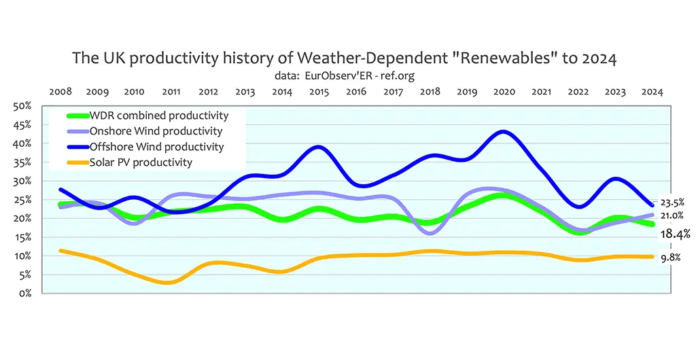Ed Hoskins,
Introduction
Germany, the United Kingdom and France account for close to half of all European Weather-Dependent “Renewables”.
The illustrations here show the hourly power production by all generation technologies. The data is as complete as possible for the UK.
The United Kingdom power generation illustrated 2024
The Gridwatch UK data had a major deficiency from 1/6/2024 to 10/7/2024, accordingly a batch of data was substituted from later in July that year. This substitution will not materially affect any cumulative results shown here.
UK Weather-Dependent “Renewables”
Productivity matters
The illustrations of UK power generation in 2024 shown above, indicate:
- the imposition of an additional ~48 Gigawatt of Weather-Dependent “Renewables” has reduced the overall UK power fleet productivity, normally ~90%, down to ~39.5%.
- in 2024 ~48GW of installed Weather-Dependent “Renewables” contributed the equivalent of ~9GW to the UK grid.
- in 2024 UK Weather-Dependent “Renewables” achieved a combined productivity of ~18.4%, a relatively low value.
- in 2024 Offshore UK wind power, which is normally quite productive, only achieved the low level of productivity of 23.5%.
- the unreliability and intermittency of both Onshore and Offshore Wind power is clear from the third graphic above:
- Wind power output can vary from close to full power on occasions down to virtually nil power output within a few hours.
- Solar power is inevitably diurnal, very variable Summer to Winter and dependent on cloudiness. The UK is one of the cloudiest nations.
- Solar power consistently has continued its low overall productivity of only ~10%.
- Solar power contributed most power at periods of low demand during the summer and very little during the winter, the period of high demand.
- the daily timing of the contribution from Solar power does not meet the high power demand in winter evenings.
- although capital installation costs of Solar power are almost comparable to Gas-firing for nameplate capital costs, Solar power output actually costs ~10 times as much as Gas-firing to install and maintain when its low productivity is taken into account.
- the UK is heavily dependent on imported power, largely Nuclear from France, the Netherlands and Norway, amounting to ~15% of power generation over the year, with the UK exporting power only on rare occasions.
- UK energy security is at risk by having to rely on imported power:
- Norway is already considering curtailing its exports to the UK and retaining its power output for its own domestic use.
- France has threatened its supply to the UK in a dispute over the Channel Islands.
- imported power was close to equivalent to the output of the whole of the UK’s current indigenous consistent Nuclear power generation.
- the final closure of the last UK Coal-fired power station occurred in 2024, it contributed less than 1% of power demand before closure.
- the installation of ~48GW, Weather-Dependent “Renewables” ~65% of the present UK generation fleet, also produced a similar ~30% cumulative power output as from Gas-firing but that “Renewable” power output was non-dispatchable on demand: “Renewables” achieved at a combined productivity of only ~18.5% in 2024.
- imported Biomass, with CO2 emissions about 4 times that of Gas-firing, contributed a dispatchable ~7% of UK demand.
- using imported Biomass negated all and any CO2 emissions savings made by other Weather-Dependent “Renewables”.
- with a installation of ~10GW+ Natural gas generated about 30% of all UK power at a productivity of ~87%: this power output was flexibly dispatchable, available to meet demand.
- Gas-firing, but not using indigenous UK gas resources, was largely able to compensate for the intermittency and unreliability of the large scale imposition of Weather-Dependent “Renewables” already installed in the UK.
Data: gridwatch.templar.co.uk ref.org
Related
Discover more from Watts Up With That?
Subscribe to get the latest posts sent to your email.








